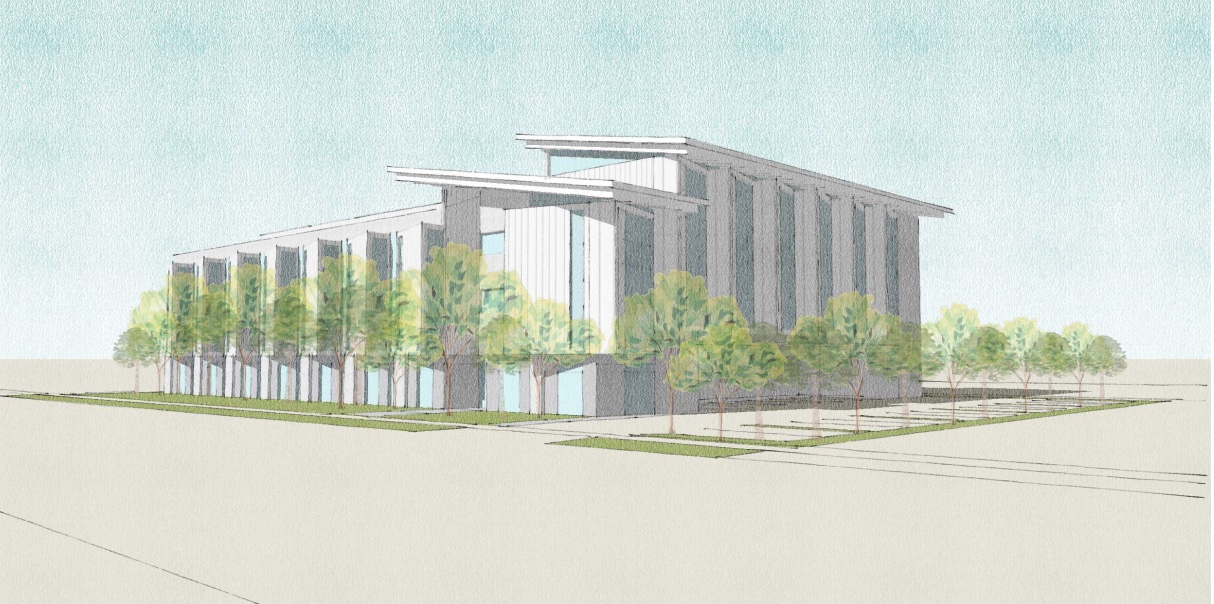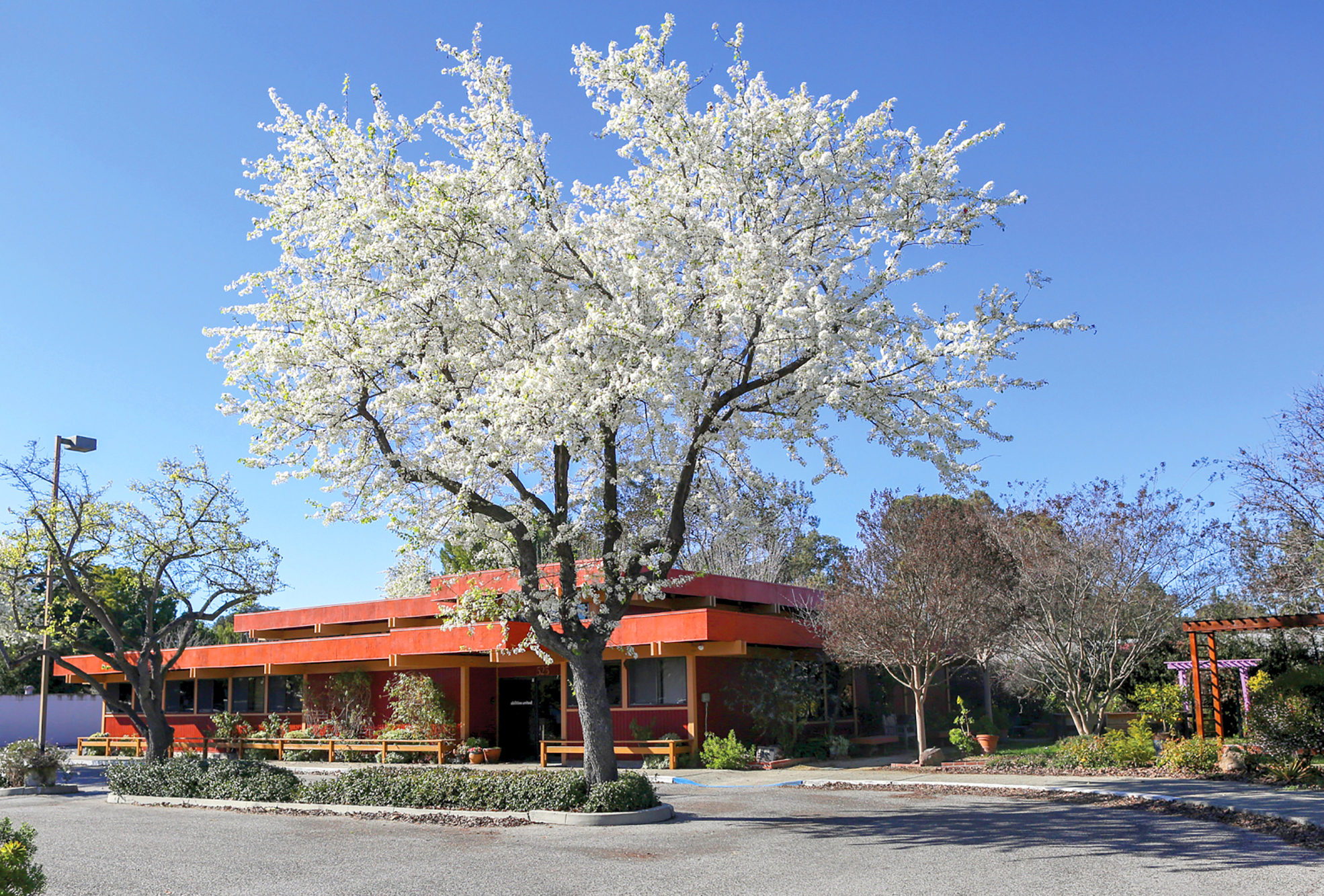A partnership between Eden Housing and Santa Clara County may soon bring that rarest of commodities — affordable housing for individuals with developmental disabilities — to a Palo Alto site near Mitchell Park.
The proposal, which the Palo Alto City Council will discuss on Sept. 27, stems from a partnership between Santa Clara County, which owns the site at 525 E. Charleston Road, and Eden Housing, a nonprofit developer that specializes in affordable housing. In April, after soliciting requests for proposals, the county chose Eden Housing to develop the south Palo Alto site to create housing for lower-income residents with developmental disabilities. The project will take advantage of a $40 million program that the county created in 2018 to support such housing projects at various cities throughout the county.
Supervisor Joe Simitian, whose district includes Palo Alto, strongly advocated for the program, as well as for the Charleston project. In February 2020, when the county started exploring housing for the site, Simitian noted in a statement that these efforts are particularly necessary because people with severely disabling conditions often have limited incomes, which makes finding affordable housing extremely challenging. Furthermore, they normally don't qualify for supportive housing within the county unless they become homeless.
"And given that community members with developmental disabilities are particularly at-risk of grave harm if they become homeless, it's absolutely crucial that we find ways to keep them housed, with the services they need," Simitian said.
The area around the project offers numerous such services. AbilityPath, a nonprofit that specializes educational, therapeutic and job-training services to individuals with special needs, currently occupies the site at 525 E. Charleston Road. Its office would be demolished to make way for the new four-story building, which would then house the nonprofit at the ground floor. Mitchell Park, which is home to the all-inclusive Magical Bridge playground, Cubberley Community Center and Charleston Shopping Center are all a short stroll away from the site. So is Ada's Café, which is next to the Mitchell Park Library and employs individuals with disabilities.
Eden's description notes that the abundant amenities in the area surrounding the project site make it an "ideal location" for housing residents with intellectual or developmental disabilities and that it will "enable residents to lead independent lives."
For Eden Housing, the proposal for 525 E. Charleston Road is its first Palo Alto venture since 2009, when the city approved its plan for 801 Alma St., a downtown development for low-income families. The 50-apartment project, which was completed in 2013, was the last major 100% affordable-housing development to win approval in Palo Alto until 2019, when the council gave the green light to a proposal from Alta Housing for a 58-unit apartment complex called Wilton Court in the Ventura neighborhood.
Much like the Wilton Court project, which is located at 3705 El Camino Real, the Mitchell Park development would reserve a significant share of its apartments for residents with developmental disabilities. Consistent with the goals of the county's program, the development would designate 25 of its 50 apartments to individuals with special needs.
According to project plans, the building would consist of 39 studio apartments, six one-bedroom apartments and five two-bedroom apartments, one of which would be occupied by the building manager. The project description argues that the development would meet a "great need for deeply affordable housing that is only expected to grow in coming years."
The apartments would be leased to households earning at or below 30% to 60% of area median income. In Santa Clara County, this amounts to between $34,800 and $69,600 for a one-person household; between $39,780 and $79,560 for a two-person household; and between $55,760 and $89,520 for a three-person household.
Studio rents would range from $870 to $1,740; one-bedroom apartments would be rented out for between $932 and $1,864; and two-bedroom apartments would go for between $1,119 and $2,238, according to the proposal submitted by Eden Housing.
The project comes at a time when the city is falling well short of its own housing goals, which call for about 300 new housing units per year, and regional mandates. Even after approving the Wilton Court project last year, the council has met only 15% of its housing allocations for both the "very low" and "low" income groups as of 2020 for the period that stretches between 2015 and 2023.
"We realized there was such a huge need for affordable housing," Matthew Indimine, communications and advocacy manager at Eden Housing, told this news organization in an interview. "We do have another property in Palo Alto and we thought it would be a great place to continue to create homes for those that need it most."
The Mitchell Park project, which is next to the Greenmeadow neighborhood, takes some cues from the neighborhood's Eichler aesthetic. The preliminary design shows a sloped roof and the building will include clerestory windows to bring more light into the apartments, a key Eichler objective.
Since getting chosen by the county for the partnership, Eden Housing has been hosting community meetings to solicit feedback about the proposal, input that has helped to guide the project's design, said Kate Blessing-Kawamura, project developer at Eden Housing. Residents have urged the development team to pay particular attention to traffic circulation at the site to ensure bicyclist and pedestrian safety. Some also urge Eden to protect the privacy of nearby residents.
Blessing-Kawamura said Eden responded to the traffic concerns by having a single entry and exit point at the site to minimize potential conflict between bicyclists and pedestrians. And to boost privacy protection, Eden included trees that screen the view in front of the building and designed the windows so that they wouldn't point directly across Charleston, she said.
"I think it's been an awesome, gratifying process to really work together with neighbors and community members to design this building together," Blessing-Kawamura said.
While the council is not scheduled to take any action on the Eden Housing development this month, planning staff expect to see a request for $2 million to support the project based on preliminary conversations with the applicant, according to a report from the Department of Planning and Development Services.
The report notes that the project is requesting numerous waivers and design concessions, including a request for greater height and more density than would normally be allowed in the "public facility" zone at the site. Because the project is within 150 feet of a single-family zone, it would normally be subject to a 35-foot height limit. A portion of proposed building would reach a height of 44 feet. It is relying on density bonuses, in accordance with state law, for an extra 12,000 square feet of building area.
The staff report notes that after the council discussion, Eden Housing will determine how they want to proceed. While there is no set date for a formal application to be submitted, the city anticipates that it will be subject to the streamlining provisions of Senate Bill 35, with limited opportunities for public input.
"If Eden Housing files an application in accordance with SB 35, the project would be processed as a ministerial application," the staff report states.




Comments
Registered user
Jackson Park
on Sep 22, 2021 at 11:54 pm
Registered user
on Sep 22, 2021 at 11:54 pm
Cities should be encouraging development of ALL types of housing. When someone upgrades to better housing, their current housing becomes available. This "chaining" happens all the way down to super affordable housing. The best thing the cities could do would be to not impede developers.
Registered user
another community
on Sep 23, 2021 at 3:37 am
Registered user
on Sep 23, 2021 at 3:37 am
When the more affluent flock to a community, the current apartment owners see an opportunity to upgrade and get more rent. By relatively inexpensive even cosmetic changes to the older buildings, they can jack up the rents on what was previously naturally somewhat affordable housing.
So this type of regulated BMR unit creation is very important. Where else will those who are displaced from the gentrification go when their apartment is "upgraded?" Rent control modulates this somewhat but the basic scenario is accurate. Even a rent controlled unit is allowed to increase. It eventually becomes too expensive for some of the current tenants, and they are displaced that way. As they leave a unit, that's when the "upgrade" process can begin for the landlord.
I don't think that the development of market rate apartments has been impeded. The problem is the new units are all luxurious and aimed at a market with substantial disposable income, e.g. such as is found with many of the YIMBY adherents. We need to concentrate on BMR unit creation to address the current housing problems. There is not really a shortage of market rate units--it's just that developers aim too high on the scale of luxury.
Registered user
Cuesta Park
on Sep 23, 2021 at 4:46 pm
Registered user
on Sep 23, 2021 at 4:46 pm
Dan, that theory is widely distributed but is deeply flawed. Building large amounts of market rate (/expensive) housing will not bring down most rents in Mountain View.
Data shows that developers wildly prefer building market rate housing over housing for the poorest and/or “average” residents (see “Housing units, built and planned, for 2015 through 2023 in Mountain View”, Web Link ). Some argue that average residents benefit when market rate housing is constructed, using this logic: imagine 1000 expensive units are created; rich folks who can afford the best move into them, making their old (now less desirable) units unoccupied. Slightly less affluent folks move up into these empty units, and the process repeats. Eventually the cheapest units become even cheaper, or so the logic goes. This is an example of increased supply while demand remains constant.
Now imagine a different scenario: 1000 expensive units are created; 1000 new tech workers are hired from out of state and move into them. Nobody moves out of their old housing; none of the existing housing becomes cheaper as a result. This is an example of increased supply when demand also increases: notice it did not lower anyone's rent.
Key point: the laws of supply and demand have not one but TWO parts. The reason that “build, baby, build” seems so “logical” is that many people unwittingly forget about the “demand” part of the equation. When demand for housing is very high, as it is in Mountain View, increasing supply does not automatically lower prices. Remember: developers prefer to build market rate housing. They see strong demand for it.
The true cause of unaffordable housing in the Bay Area is NOT a lack of supply, it is excessive demand. Most everyone who talks about a jobs/housing imbalance acknowledges this, perhaps unwittingly. Job availability increases demand for housing near jobs. Well-paying jobs drive up the cost of housing. Big Tech wants to create many more!
Registered user
Cuesta Park
on Sep 29, 2021 at 2:37 pm
Registered user
on Sep 29, 2021 at 2:37 pm
ah BMR / "Below Market Rate", this type of project with goverment participation follows "the Golden Rule". Those with the Gold (the gov agencies) make the BMR sales contracting rules. And those rules (I think) become deed covenants attached to the title of the property. Legally enforcable when the owner might sell or wish to sell and a new owner 'upgrade tentants for more income'. Even non-profits can bug out or go bankrupt - contract law and 'the art of the deal' will keep these rentals BMR.